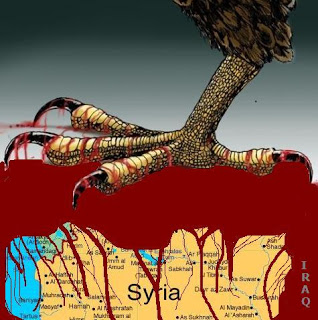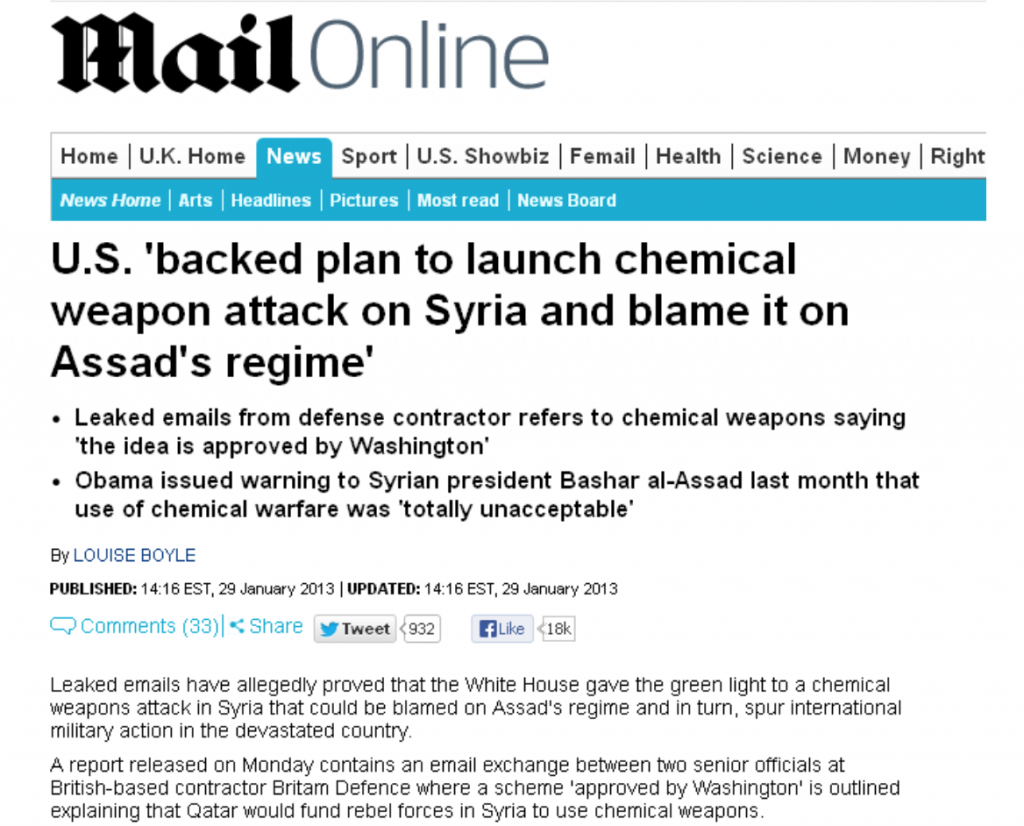

| Online: | |
| Visits: | |
| Stories: |

| Story Views | |
| Now: | |
| Last Hour: | |
| Last 24 Hours: | |
| Total: | |
Chemical Attack in Idlib – Duplication of Scenario in Eastern Ghouta

By Mariam al-Hijab / Inside Syria Media Center
The strike was approved by U.S. President Donald Trump, who said that the Syrian Air Force used affiliated al-Shayrat air base to prepare the chemical attack on the city of Khan Shaykhun in Idlib.
“It is in this vital national security interest of the United States to prevent and deter the spread and use of deadly chemical weapons”, Trump said.
Previously on April 4, several European states accused the Syrian Air Force of using warfare poisonous agents while striking Khan Shaykhun. The Syrian government, in turn refuted these accusations, stating that the target of the strike was a position held by the “rebels” where they managed a chemical depot. The strike led to the spread of poisonous agents and dozens of casualties among civilians.
Although the situation in Khan Shaykhun remains unclear, the U.S., France and Great Britain have already prepared and sent a draft resolution to the U.N. In the draft they casually without evidence attributed responsibility for the death of civilians to the Syrian government.
The tragedy in Khan Shaykhun allowed Washington to renew the scenario developed in 2013 in relation to the chemical attack in Eastern Ghouta. Then the U.S. President Barack Obama also considered launching a possible military strike on Syria, ironically in order to prevent the use of chemical weapons in future.
However in 2013 there were some important factors which interrupted U.S. plans to initiate a large-scale military operation against Syria. The evidence regarding the use of chemical weapons pointed to the involvement of the U.S. and their allied groups,
It turned out to be fake. This provocative act had been carefully planned by military experts. This is confirmed by the hacked correspondence of U.S. Army Colonel Anthony Jamie MacDonald, who was general staff director, operations and plans office of the deputy chief of staff for intelligence the army staff in 2013.
On August 22, the day after the chemical attack, MacDonald received a message from his colleague Eugene Furst with congratulations on the “successful operation” and a link reference to an article on Eastern Ghouta in The Washington Post.
The media leak of MacDonald’s correspondence has become another evidence proving that the Syrian government was not involved in the use of chemical weapons in Eastern Ghouta.
Earlier Damascus has already been blamed for using a poisonous substance, but all these attempts have failed. Similarly in 2013, the UN investigation proved that the militants were responsible for the use of sarin, according to the head of the UN mission Carla Del Ponte.
Subsequently the chemical weapons in the hands of opposition groups was recorded on video.
Moreover, the American analysts also pointed out to the doubtful nature of the information proving the involvement of Damascus in the chemical weapons attacks. In an open message to Barack Obama former CIA officers blamed CIA director George Bennett for providing unreliable information to the U.S. authorities regarding to the incident in Eastern Ghouta and the propaganda ploy intended for members of the U.S. Congress, the media and the public.

Finally, under pressure of the world community, Washington had to join the Russian initiative to eliminate chemical warfare agenda in Syria. This operation was held under the supervision of the Organization for the Prohibition of Chemical Weapons (OPCW) and successfully completed in January 2015.
As in the case of Eastern Ghouta, the western media have been biased towards the incident in Khan Shaykhun, accusing the Syrian government for the death of civilians prior to the release of the preliminary results of an investigation. Furthermore not to burden readers with unnecessary doubts, the Daily Mail removed from its website an article confirming a U.S. plan to stage a False Flag chemical attack in 2013 with a view to incriminating the government.
Against this background, the Washington’s decision to fall back upon the East Ghouta scenario raises many questions.
First, it contradicts Donald Trump’s election campaign, when he promised to stop actions directed against Bashar Assad and focus instead on fighting terrorism.
Second, the accusation directed against Damascus regarding the use of chemical weapons contradicts the statement of OPCW about the successful conclusion of its program in Syria, in which the U.S. also took part.
Third, it is unclear what the White House wants to achieve by escalating the conflict in Syria.
It would appear that the chemical attack in Idlib is another provocation by the U.S., which is trying to justify the need of a US military intervention in Syria.
Mariam al-Hijab is the editor-in-chief of Inside Syria Media Center.
www.globalresearch.ca contains copyrighted material the use of which has not always been specifically authorized by the copyright owner. We are making such material available to our readers under the provisions of “fair use” in an effort to advance a better understanding of political, economic and social issues. The material on this site is distributed without profit to those who have expressed a prior interest in receiving it for research and educational purposes. If you wish to use copyrighted material for purposes other than “fair use” you must request permission from the copyright owner.
For media inquiries: [email protected]





I would hope Trump doesn’t react to any provocation coming out of Syria after this latest attack before he has 3 independent sources from unrelated fields. I fully expect to see another horrendous act perpetrated on the Syrian people within the up and coming months. There is good reason to be highly suspicious of reflexing accusations claiming Assad is behind it.